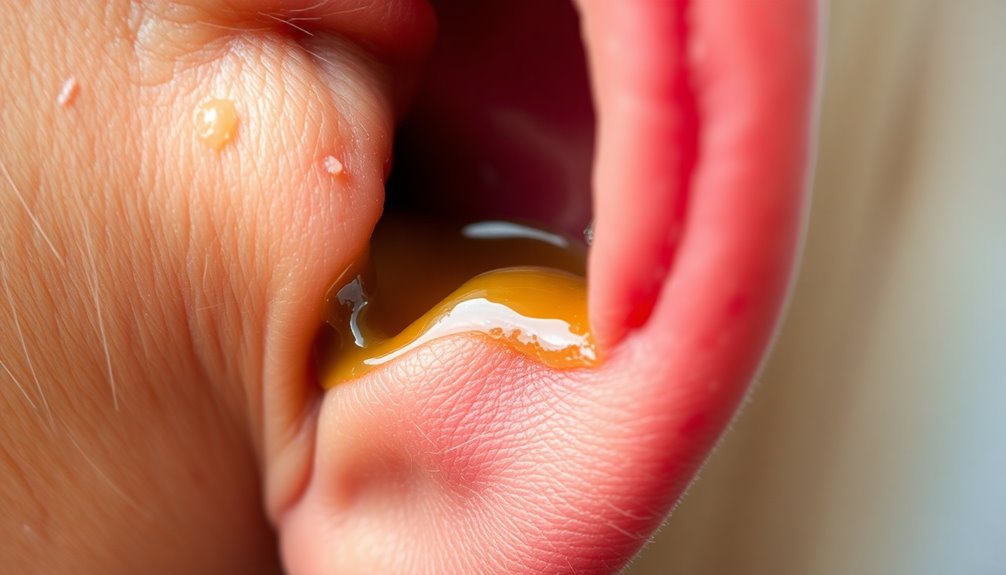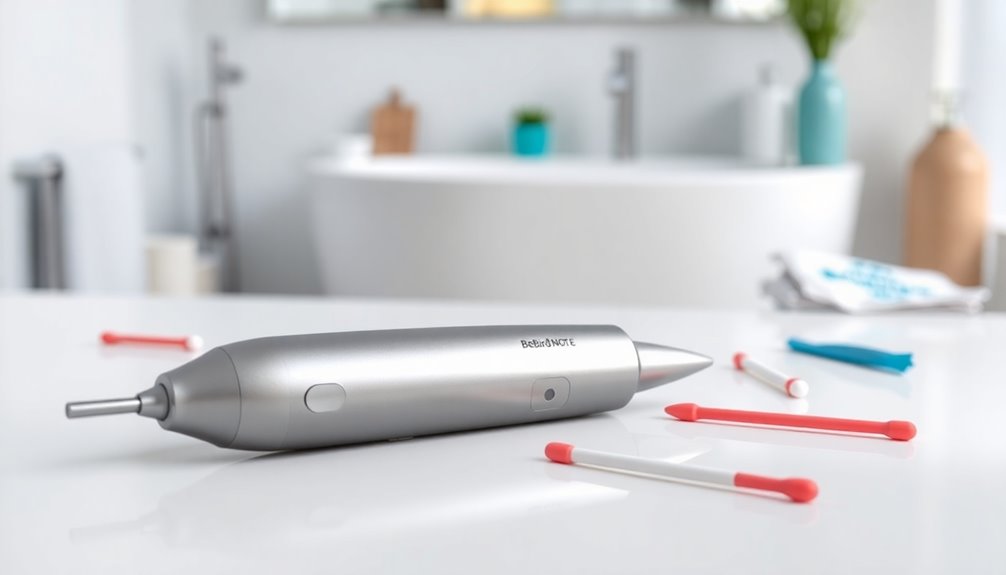Sleeping with AirPods in isn't a great idea. They can trap moisture and bacteria in your ear, leading to painful infections. Using them for extended periods increases the risk of noise-induced hearing loss, especially if the volume's up high. Plus, they can disrupt your sleep cycle, preventing you from reaching deep sleep. You might also experience discomfort or ear aches while sleeping on your side. On rare occasions, AirPods can even overheat, posing serious safety concerns. Want to know better alternatives or more tips on ear health? Keep going to find out!
Key Takeaways
- Sleeping with AirPods can disrupt natural sleep cycles, preventing deep sleep and leading to chronic sleep deprivation.
- Prolonged use may cause ear pain, soreness, and skin irritation due to pressure and improper fit.
- High volume levels can risk noise-induced hearing loss, especially if sound safety alerts fail during sleep.
- Wireless earbuds may overheat or malfunction, posing rare safety risks, including battery fire hazards.
- Alternatives like white noise machines or sleep headphones can enhance sleep quality without the associated risks of using AirPods.
Infection Risks
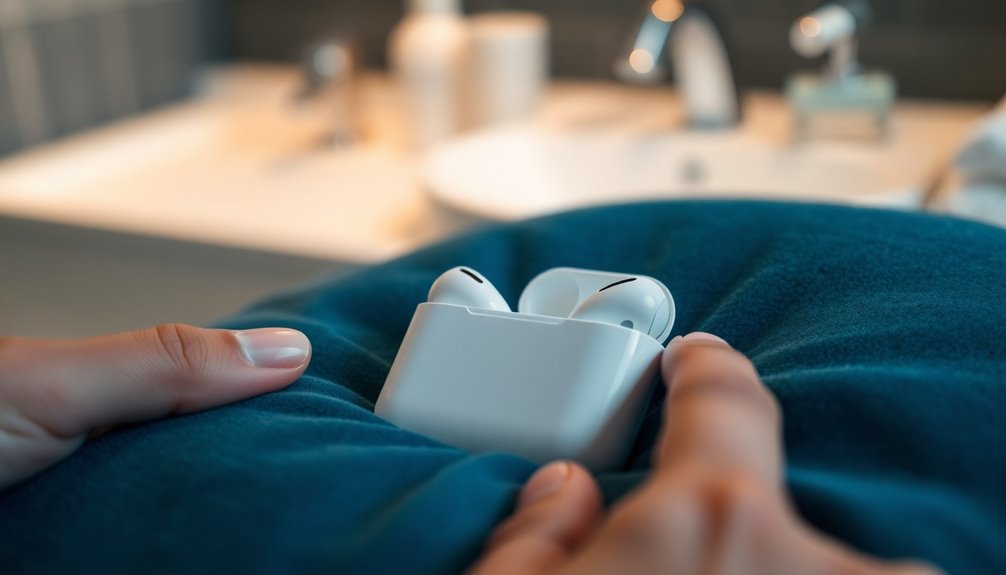
Many people love the convenience of sleeping with AirPods in, but this habit can pose significant infection risks. When you wear earbuds overnight, they create a warm, moist environment in your ear canal, trapping moisture and bacteria. This situation interferes with your ears' natural self-cleaning process and heightens the risk of conditions like Otitis Externa, commonly known as Swimmer's Ear. Additionally, using AirPods can lead to earwax accumulation. The earbuds may push wax deeper into your ears, causing it to dry out and potentially become impacted. This trapped wax and moisture can increase the likelihood of infections, resulting in discomfort and irritation.
There's also the risk of physical damage. AirPods can scratch the ears, making them more vulnerable to bacterial invasion. Such scratches can lead to painful ear infections, especially in younger users, accompanied by symptoms like pain, itching, and fluid discharge. Furthermore, prolonged use of earbuds can lead to increased earwax buildup, compounding these issues and creating an even higher risk of infection. To minimize these infection risks, maintain good hygiene. Regularly clean your AirPods and avoid sharing them. Cleaning with alcohol once a week can help keep infections at bay and protect your ears from unnecessary complications.
Hearing Damage
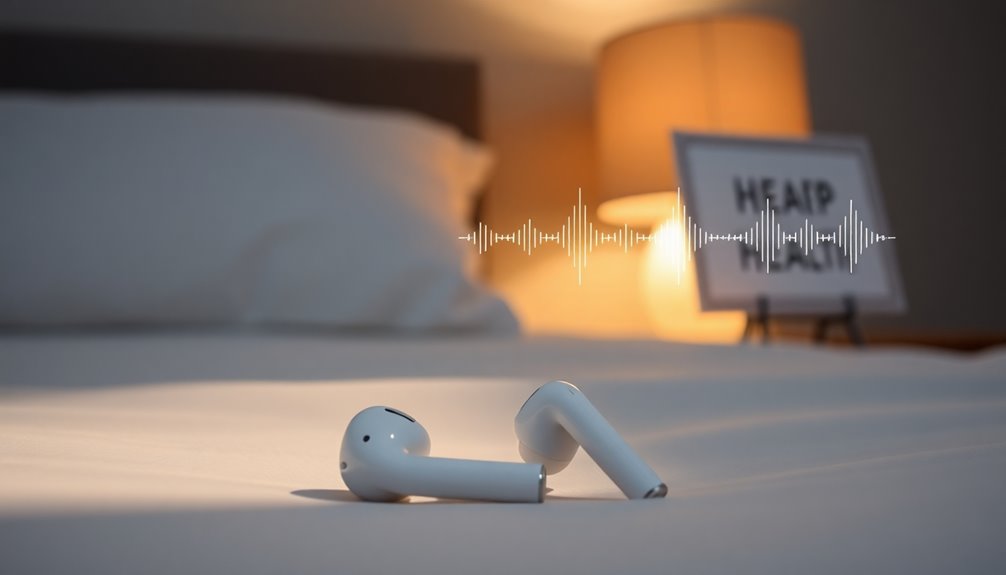
Sleeping with AirPods in can significantly increase your risk of hearing damage, especially if you often listen at high volumes. Sounds above 85 decibels can lead to noise-induced hearing loss, and the maximum volume on AirPods can exceed 100 decibels. Prolonged exposure to such levels can harm your hearing, with each 3-decibel increase cutting your safe listening time in half.
Even if you keep the volume lower, continuous use can strain your ears over time. Tinnitus, which causes a ringing or buzzing sound in the ears, can also worsen with loud audio. The high-pitched tones from AirPods can mimic tinnitus symptoms, making them a potential trigger. Additionally, using headphones while sleeping can mitigate effects of emotional and physical stress, which may tempt users to listen at even higher volumes for relaxation.
Cumulative exposure to loud sounds increases your risk, particularly for younger users who might not notice gradual hearing loss until it's too late. Regular hearing tests have shown alarming rates of hearing damage in those frequently using earbuds. To protect your hearing, consider following safe listening guidelines, like keeping the volume at a level where someone nearby can speak without raising their voice. Taking breaks and using noise-canceling features wisely can also help reduce your risk of hearing damage.
Sleep Quality Impacts
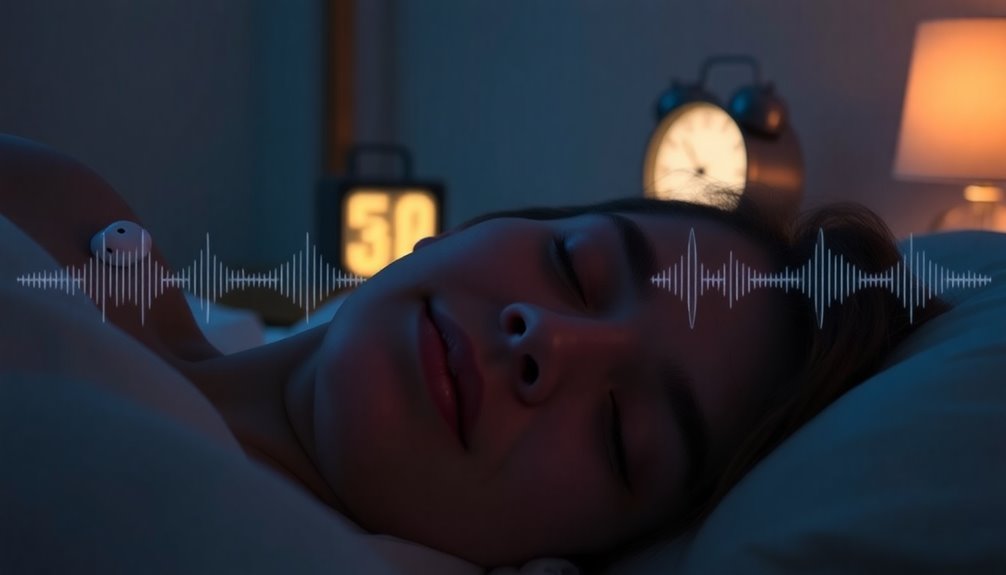
While you might enjoy the soothing sounds from your AirPods as you drift off, doing so can seriously disrupt your sleep quality. The presence of earbuds interferes with your natural sleep cycle, preventing your body from entering deep sleep phases efficiently. This disruption can lead to lighter sleep stages and frequent awakenings, ultimately compromising the restorative nature of your sleep.
Relying on AirPods to fall asleep creates a dependency that can make it difficult to drift off without them. If you find yourself in a situation where your AirPods aren't available, you may struggle to sleep, hindering the development of healthy sleep habits. Over time, this can result in chronic sleep deprivation, leaving you feeling tired and less refreshed each morning. Moreover, untreated sleep apnea, which affects over 1 billion people worldwide, can exacerbate these sleep issues, making it even more crucial to seek healthier alternatives.
Furthermore, the overall quality of your restorative sleep diminishes when you consistently use AirPods. This negatively impacts your body's ability to repair and rejuvenate during the night. To enhance your sleep quality, consider alternatives like white noise machines or establishing a calming bedtime routine. Avoid using devices that require inserting objects into your ears, as these may contribute to ongoing sleep issues.
Physical Discomfort
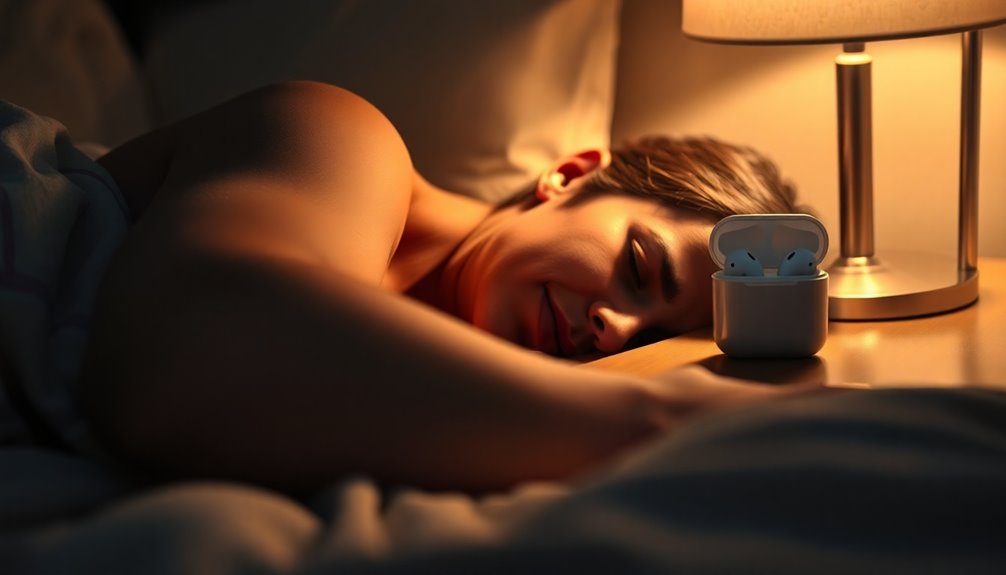
Wearing AirPods at night can lead to significant physical discomfort, especially if you sleep on your side. The pressure from the earbuds against your ear canal can cause earaches and soreness, disrupting your sleep. If the AirPods aren't the right fit for your ears, you might experience scratching or pain, making it hard to get comfortable. Additionally, the weight of the AirPods can add to your discomfort, leading to a restless night. They can become dislodged, increasing the risk of injury by pressing against your ear or even getting lodged deeper in your ear canal. The longer you wear them, the more likely you are to wake up with ear pain due to prolonged pressure points.
Wearing AirPods can also trap moisture in your ears, which may lead to bacterial growth and increase the risk of infections. Using earbuds designed specifically for sleep can help alleviate some of this discomfort. Ensuring a proper fit is crucial, as is choosing softer materials like silicone or memory foam for enhanced comfort. Regular breaks from wearing AirPods can also minimize the risk of soreness and injury. Ultimately, your comfort should be a priority, so consider these factors before deciding to sleep with AirPods in.
Battery and Safety Concerns
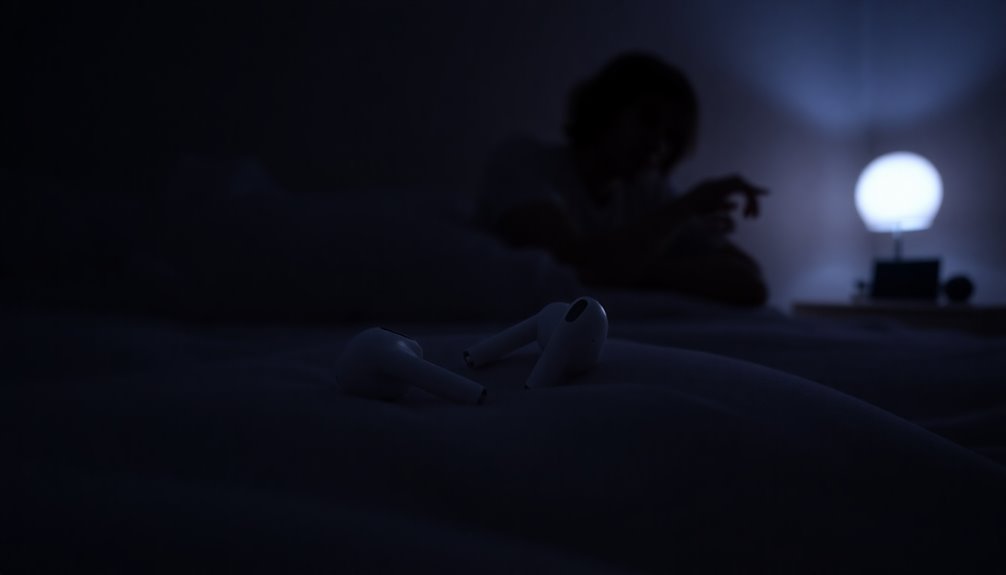
Have you considered the potential battery and safety concerns of using AirPods while you sleep? While they might help you drift off, these wireless earbuds come with risks that shouldn't be ignored. For instance, electronic devices can overheat or malfunction, and if you're asleep, you may not notice these issues immediately. Continuous use can lead to battery degradation, increasing the chances of unexpected failures. Moreover, the rare but serious risk of a battery fire exists if the device malfunctions severely. You won't be able to monitor the condition of your AirPods in real-time during sleep, which can amplify these safety concerns. Additionally, the sound safety alerts feature in AirPods helps protect your hearing, but it won't function if you're asleep and not aware of the volume levels. The dependency on AirPods for sleep can also disrupt your sleep cycle and overall sleep quality, making it harder to fall asleep without them over time. Before you decide to wear AirPods while sleeping, weigh these battery safety risks against the potential benefits. Consider exploring safer alternatives, like over-the-ear headphones or external speakers, to minimize these concerns and promote a healthier sleep environment. Ultimately, prioritizing your safety is crucial when it comes to sleep habits.
General Health and Hygiene
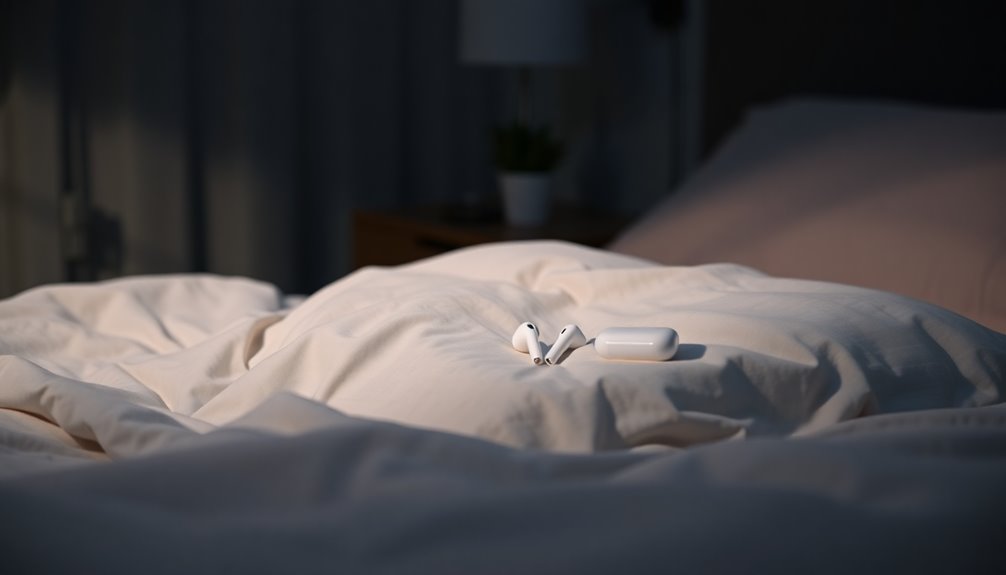
Your ear health and hygiene can be significantly impacted by using AirPods during sleep. When you wear them, moisture and earwax can accumulate in your ear canal, increasing the risk of bacterial growth and potential ear infections. If you neglect cleaning your AirPods, dirt and debris may build up, impairing audio quality and posing more serious ear health issues. To maintain hygiene, you should regularly clean your AirPods. Use disinfecting wipes for the exterior surfaces and micellar water or distilled water for the meshes, especially for AirPods 3 and 4. Regular cleaning is essential to prevent dirt, debris, earwax, and bacteria from accumulating. Avoid exposing your AirPods to soaps or other substances that could damage them, and always dry them completely before using or storing them.
Wearing AirPods can also lead to physical discomfort, like ear pain or skin irritation from sweat and other products. They might even get dislodged, causing injury. To maximize comfort, keep both your AirPods and your skin clean and dry.
Ultimately, while AirPods can enhance your listening experience, consider the potential health risks and prioritize your ear hygiene to avoid complications.
Frequently Asked Questions
Can Airpods Cause Long-Term Damage to My Ears?
Yes, AirPods can cause long-term damage to your ears. Listening at high volumes for extended periods risks noise-induced hearing loss, especially if you exceed safe sound levels. Additionally, the closed environment can lead to ear infections due to moisture and wax buildup. You might also experience discomfort or pain from prolonged use. It's essential to monitor volume levels and take breaks to protect your hearing health in the long run.
How Often Should I Clean My Airpods?
You should clean your AirPods every 72 hours of usage, which often means weekly for regular users. The more you use them, the more often you'll need to clean them. Regular cleaning keeps sound quality up and ensures hygiene by removing earwax and bacteria. To clean, use a lint-free cloth and a fine-edged tool, avoiding sharp objects and water. Neglecting this can lead to discomfort and damage your AirPods over time.
Are There Safer Alternatives for Sleeping With Music?
If you're looking for safer alternatives for sleeping with music, consider using external speakers. They let you enjoy sound without risking ear infections or moisture buildup. You can also explore natural sounds, like rainfall or ocean waves, which provide a soothing atmosphere. White noise machines or sleep playlists can mask background noise effectively, creating a peaceful environment without the discomfort of earbuds. This way, you stay aware of your surroundings while enjoying restful sleep.
Do Noise-Canceling Features Impact Ear Health?
Noise-canceling features can impact your ear health. While they help reduce background noise, prolonged use at high volumes might strain your ears, potentially leading to hearing loss or tinnitus. Even with noise cancellation, it's crucial to keep the volume below 80dB to protect your hearing. Additionally, discomfort from pressure points can occur, so consider using specially designed sleep headphones. Prioritizing your ear health while enjoying your music is essential.
Can I Use Airpods While Exercising or Swimming?
You can definitely use AirPods while exercising, especially for activities like weightlifting or cycling, as they tend to stay in place. Just be cautious with running, as they might not fit as securely. Remember, they're sweat-resistant, but don't expose them to water for too long. For swimming, avoid using them altogether since they're not waterproof. Always clean them after workouts to maintain performance and longevity!
Conclusion
In conclusion, while it might seem convenient to sleep with AirPods in, it's essential to consider the risks involved. You could face infection, potential hearing damage, and even discomfort during the night. Plus, battery safety and hygiene issues can add to the concerns. To ensure a better night's sleep and protect your health, it's wise to take them out before you drift off. Your ears will thank you for it!

